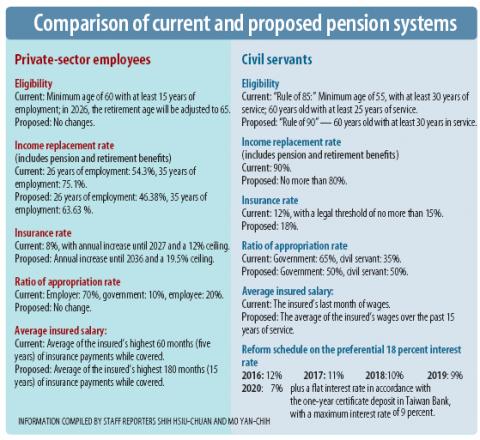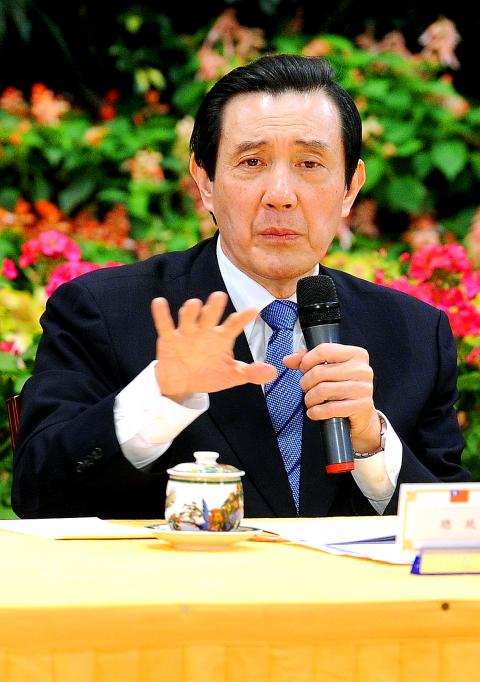|
Ma announces pension
reforms
DOUBLE TROUBLE: President Ma Ying-jeou described
the nation’s current pension system first as a time bomb, then as a runaway
train that is traveling toward a cliff
By Mo Yan-chih / Staff reporter


President Ma Ying-jeou announces
the government’s pension reform proposals at the Presidential Office in Taipei
yesterday.
Photo: Chu Pei-hsiung, Taipei Times
President Ma Ying-jeou (馬英九) promised to
protect the nation’s pension system from going bankrupt for the next 30 years as
he unveiled the government’s pension reform proposals yesterday, insisting that
his administration would strengthen its communication with the legislative
branch as it prepares to send the draft for approval in April.
Accompanied by Premier Sean Chen, Legislative Speaker Wang Jin-pyng (王金平) and
Examination Yuan President John Kuan (關中) at a press conference to explain the
government’s pension reforms, Ma said that he would give up his right to the 18
percent preferential interest rate on his retirement pension, which would be
about NT$23,000 a month.
“The proposal is not perfect, but we’ve tried to make it a thorough one after
gathering opinions. The pension system is everyone’s system and we cannot afford
letting it collapse. People may receive less money after the reforms, but the
revised pension system will assure that we receive our pension without having to
worry for at least 30 years,” Ma said at the Presidential Office.
He described the nation’s current pension system first as a time bomb, then as a
runaway train that is traveling toward a cliff, and said that it is a priority
that the government reform the system immediately, else the Labor Insurance Fund
and the retirement funds for the military, civil service and teachers would go
bankrupt between 2019 and 2027.
“The pension system time bomb won’t explode during my term ... However, the
train will definitely fall off the cliff if we don’t start building a bridge
right now,” he said.
The proposed reforms are to be implemented in stages.
Kuan said the government would adopt a “rule of 90” system for civil servants in
2016, in which a civil servant can only retire if their age and years in service
add up to 90.
For example, a civil servant who has reached the age of 60 and has accumulated
30 years of service would be eligible for retirement. Currently, civil servants
can retire if their age and years in service add up to 85.
There would be a 10-year grace period for the new system, while civil servants
in special fields, such as police officers and firefighters, would be excluded
from the new system, he said.
In the future, the retirement pensions of civil servants should not exceed 80
percent of their final income, he said.
The government also plans to reduce the contentious preferential 18 percent
interest rate on savings accounts held by retired civil servants to 9 percent
within the next four to five years, he said, adding that civil servants who
retired before July 1999 would not be affected by the change.
Kuan said the government would also establish a three-tier pension system for
civil servants.
The first tier would be a national pension with a 15 percent contribution from
gross salary, the second a mandatory occupational scheme with a 30 percent
contribution and the third a non-mandatory commercial pension, also with a 30
percent contribution.
When asked about the growing disputes over the reforms and divisions in society,
Ma insisted that the government has tried its best to design a pension system
that would narrow the gap between those working in different industries.
He said the government would review the system every five years as it seeks to
establish a modernized and systematic pension policy.
Both Ma and Wang dismissed concerns about opposition to the government’s reforms
among lawmakers across party lines.
Ma insisted that the government would continue to communicate with lawmakers
regarding the reforms, while Wang said that he would facilitate the legislation
once it is sent to the legislature for approval in April.
|
![]()
![]()
![]()